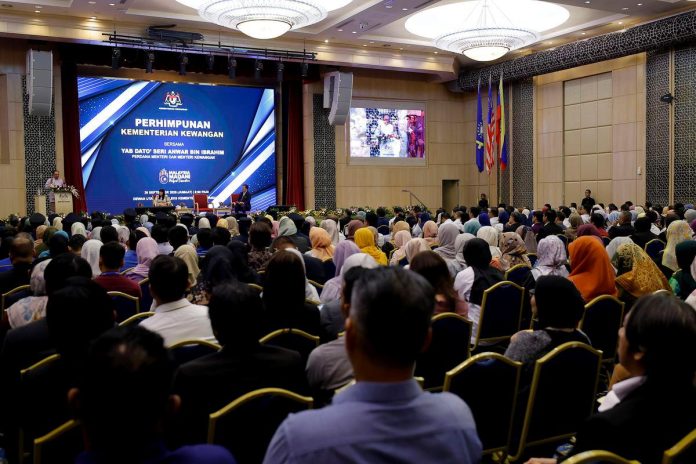PUTRAJAYA: Good governance and effective economic policies have enabled Malaysia to lower the price of RON95 petrol to RM1.99 per litre, easing the burden on the people compared with other countries, including oil producers, said Prime Minister Datuk Seri Anwar Ibrahim.
He said the announcement of the price reduction had received a positive response from the public, although there were also criticisms and counter-proposals that the government would review from time to time.
“And we have just announced the reduction in the price of RON95, and thank God, the public’s response has been good. Although, as usual, there are some who offer criticism or suggestions, we will carefully consider everything.
“But we must start by understanding why only a few countries are able to continue subsidy-targeting programmes to reduce the burden on the people,“ he said when addressing at the Ministry of Finance (MoF) Staff Assembly here today.
Anwar noted that although Saudi Arabia, as a major oil producer, once offered prices as low as 50 sen per litre in 2013, petrol prices there have since surged to between RM2.60 and RM2.90 per litre, while Qatar, also an oil and gas producer, has set prices higher than Malaysia.
“The answer is because we started with good governance. Here, I would like to express my gratitude to Minister of Finance II, the Deputy Minister, Secretary-General of Treasury, and all my colleagues who have carried out their responsibilities well,“ he said.
According to him, the reduction in RON95 petrol prices was made possible only after the government had implemented significant policy reforms, including more transparent tenders, measures to prevent leakages, efforts to combat corruption, and the introduction of a new economic policy that inspires confidence.
Anwar said initial proposals estimated that the government could save between RM8 billion and RM10 billion through subsidy rationalisation, but the final decision was made by taking into account the needs of the people and the country’s economic stability.
“So, after considering this, as long as we can reduce subsidy expenditure, I think it is reasonable. That is why, in terms of framework, I said the first priority is the management of the government, public finances and the nation, and this of course involves the role of all parties including the MoF, the Inland Revenue Board, Royal Malaysian Customs Department, and all enforcement agencies that help curb leakages,” he said.
He said the issue of leakages and systemic corruption within a handful of departments and ministries had tarnished the image of the civil service, but it did not reflect the majority of public servants who have played an important role in the government’s success.
“This small group is a cancer that must be dealt with. But it is not fair to generalise as though the entire civil service is mediocre. In fact, economic growth, investment and the country’s diplomatic achievements are the result of the work of the entire machinery of the civil service,” he said.
According to the Prime Minister, clear proof of the civil service’s effectiveness is the successful implementation of subsidy rationalisation, which has delivered direct benefits to the people.
“So, those who benefit from this should also know that it is the result of good governance, the sacrifices of officers at all levels, as well as cooperation from the private sector and other professionals,” he said.
Commenting on the issue of petrol subsidy quotas, Anwar explained that the decision to set the limit at 300 litres was made after in-depth analysis based on consumption data.
“The original proposal was 250 litres because 98 per cent of the people use around 200 to 220 litres a month. But after discussions at the MoF and Cabinet, we raised it to 300 litres so that it would not become an issue,” he said, stressing that the government always strives to ensure that policy decisions do not burden the people.
He also emphasised that any savings would not be used for extravagance, but would instead be channelled back to the people through welfare, training and improvements in the quality of public service.
“Yesterday we discussed with the Public Service Department (JPA) on the quality of the civil service, including the approval of additional allocations for training, postgraduate studies and new areas of expertise.
“Since last year, we have allocated hundreds of millions of ringgit in additional funds so that departments can build their own expertise, especially in digital transformation and artificial intelligence (AI),” he said.
At the same time, Anwar said critical sectors such as education and health were also given close attention, including the hiring of more doctors and nurses.
“May Allah SWT bless our efforts, bless our country, guarantee peace and political stability, and elevate the nation’s standing as a successful country in all respects, both worldly and spiritual,” he added. – Bernama







